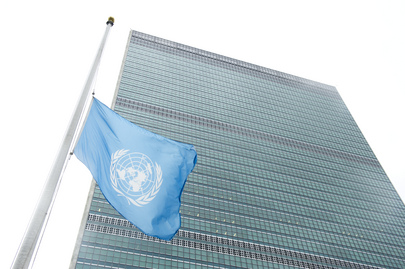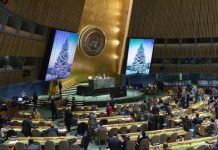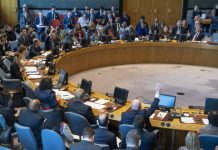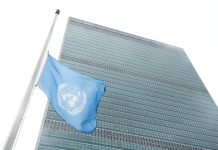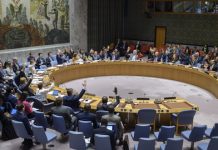Gaza: School set for polio vaccine campaign hit in deadly strike
A second round of polio vaccinations for thousands of children began in central Gaza on Monday, despite a reported strike on a school-turned-shelter in Nuseirat.
A hospital courtyard was also hit in Deir Al-Balah where “multiple tents” were set ablaze as people slept, according to the UN agency for Palestine refugees, UNRWA.
Images shared by UNRWA showed rescue workers searching for survivors on Monday at the Al Aqsa hospital site, amid burnt-out tents and mangled metal frames.
With more, here’s UNRWA spokesperson Louise Wateridge:
“I’ve been on the phone to my colleague since 3am this morning, he was sheltering in the compound of Al Aqsa hospital and was one of the many people there who lost everything. We’ve seen the photos and videos. It seems that a lot of family shelters have gone up in this in this huge inferno, and he has been caught up in this this horror and this strike.”
More video footage showed an intense blaze and smoke emanating from the middle of a series of large, tented shelters, while emergency teams removed what appeared to be a badly burned body from the ground of a charred tent.
Meanwhile, hundreds of UN staff and partners have started the second round of polio vaccinations for Gaza’s children.
At one UNRWA school-turned-shelter in Deir Al Balah, youngsters lined up for their vaccine dose, a scene that’s set to be repeated across central Gaza for the next three days, until teams move to the south for another 72 hours.
The aim is to reach around 590,000 children under 10 in less than two weeks.
Lebanon: UN peacekeepers update after Israeli tank ‘breach’
The UN Secretary-General has reiterated that the safety and security of UN personnel and property must be guaranteed, following the deliberate breach of a UN peacekeeping position by Israeli tanks in southern Lebanon.
The incident took place early on Sunday morning and involved two Israeli tanks that destroyed the main gate of a base and forcibly entered the position, according to the UN Interim Force in Lebanon, UNIFIL.
Around two hours later, after the tanks had left, several rounds were fired nearby.
For more on the situation on the ground, here’s UNIFIL Spokesperson Andrea Tenenti, speaking to UN News:
“The role of UNIFIL, maybe at the moment is even more crucial than ever because of the dangerous developments because of the increase in tension, because the ongoing shelling, because of IDF entering inside Lebanese territories. So, it’s very crucial for UNIFIL to be in the South to be able to monitor and report to the Security Council and understandably at the moment our monitoring capabilities have been limited because of the of the ongoing shelling and bombing in the area but we are still monitoring the situation.”
While tens-of-thousands have fled, there are still 350,000 people left in the south of Lebanon with no place to go. The most important part for mission right now is to make sure these local communities have their basic needs provided for.
However, this has proved itself difficult due to the heavy shelling, a situation which Mr. Tenenti emphasised was “very concerning”.
He underscored that events in recent days were not only a violation of Security Council resolution 1701 but also of international humanitarian law in that parties have the obligation to protect peacekeepers and ensure the safety and security of their troops.
New risks raise pandemic threat on a global scale
In 2024, the world faces a troubling surge in outbreaks of deadly diseases like Marburg virus, Mpox, and the latest strain of avian influenza (H5N1). Already this year, 17 such outbreaks have occurred, exposing weaknesses in pandemic prevention systems worldwide.
A new report from the Global Preparedness Monitoring Board (GPMB), which is supported by the UN World Health Organization and the World Bank, identifies 15 key drivers of pandemic risk across social, technological, environmental, economic and political domains.
The report highlights critical threats such as distrust between nations, inequities in healthcare access and the risks posed by intensive farming and potential human-to-animal disease transmission.
“The next pandemic won’t wait for us to perfect our systems,” said Joy Phumaphi, GPMB Co-Chair and former Minister of Health to Botswana, adding that “We must invest now in resilient and equitable primary healthcare systems to withstand the challenges of tomorrow.”
The report urges the global community to take collective responsibility for prevention and disease outbreak response.
Julia Foxen, UN News
Music composed and produced by Joachim Harris. All rights reserved
Source of original article: United Nations (news.un.org). Photo credit: UN. The content of this article does not necessarily reflect the views or opinion of Global Diaspora News (www.globaldiasporanews.com).
To submit your press release: (https://www.globaldiasporanews.com/pr).
To advertise on Global Diaspora News: (www.globaldiasporanews.com/ads).
Sign up to Global Diaspora News newsletter (https://www.globaldiasporanews.com/newsletter/) to start receiving updates and opportunities directly in your email inbox for free.


